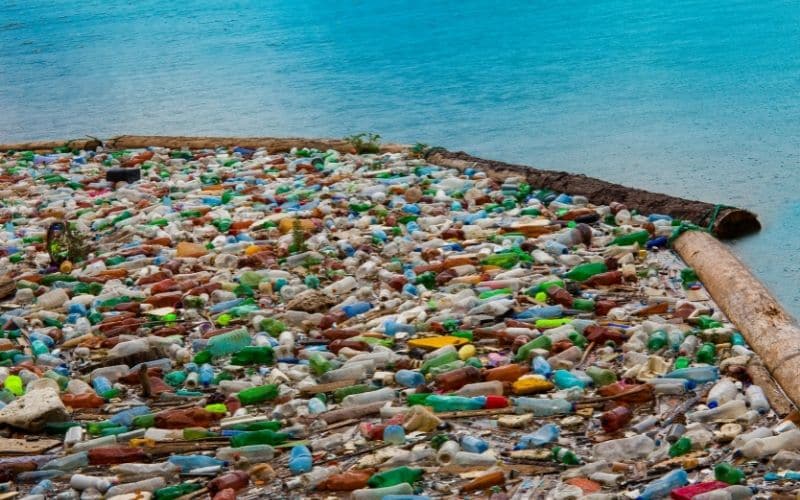Marine Pollution by Ships -Tips for Reducing & Recycling Waste at Sea
It is a proven fact that the marine industry amasses millions of tons of garbage and waste products from day to day operations each year causing massive marine pollution. (Have you heard about the pacific ocean garbage patch?)
Shipping industry, which is wholly accountable for the marine and cargo transportation, is one of the potent sources for pollution at sea. With over 70% water covering our planet, marine industry is booming each passing day. With such rapid industrial growth the marine ecological system is bound to get perturbed by unwanted issues such as those of the marine wastes and effects of marine pollution. Marine waste and the associated garbage have been proclaimed as being majorly responsible in polluting the world’s oceans.
To oversee that the shipping industry abides to the international laws and regulations, Marine Environmental Protection Committee (MEPC) and similar other groups have been formed. These Marine Environmental groups play an important role in controlling and downsizing the wastes produced due to the maritime operations. With the acceptance of Hong Kong International Convention for the Safe and Environmentally Sound Recycling of Ships in May 2009, a significant improvement in ship recycling and waste management has been observed.

IMO conventions such as MARPOL Annex 5- Garbage from Ships and other related guidelines have to some extent been able to streamline the waste and garbage management onboard marine vessels by implementing methods such as Garbage Management Plan for Ships . This also makes it vital for the vessels’ waste management teams to work together in order to understand and comply with waste reduction, recycling and management.
Tips for Reducing Waste on Ships to Reduce Marine Pollution
Waste and Garbage generated onboard ships which contribute to marine pollution comprise of chiefly plastics, dunnage and packing material, cleaning material and rags, paper products, food waste, remains of paints, solvents and chemicals. Proper handling of these waste products is critical to prevent marine pollution. Maximum efforts should be put into waste reduction and management to permit a safe and healthy work environment onboard as well as preserving a pollution free marine ecosystem. In order to reduce the waste, seafarers should take an active part in efficient ship operations and in reducing garbage production on ships.
- All marine operators to put in place waste and garbage management system with proper stowage and segregation procedures for various categories of waste materials such as plastics, batteries, food wastes, dunnage, metallic wastes, chemicals, etc. Companies should imply strict adherence to the MARPOL regulations and maintain zero dumping policy onboard their fleet. Procedures to dispose- off waste in safe and ecologically friendly environment should be included in the waste management manuals in order minimize marine pollution.
- Wastes such as plastic, metals, glass, batteries, medical wastes, oily rags, sludge, waste oils, etc. those which cannot be disposed off at sea should be incinerated or given away to shore reception facilities.
- Compactors should be used effectively to reduce the volumes of mainly plastics and other waste material which can be compressed.
- Food waste can be comminuted and discharged at sea. Also to ensure vessels are complying with the 2013 MARPOL amendments to Annex V.
- Newer techniques which separate glass from mercury and metal should be allowed onboard.
- As far as possible, reduce the production of oily waste and sludge. Usage of clean and treated fuel will not only generate lesser sludge but also will be environmental friendly. In order to improve the performance of the OWS, it is a better idea to install emulsion breaking filters on the separators.
- The marine operator’s Environmental Management System (EMS) should be maintained onboard which in turn would raise the waste management standards and also reciprocate to the zero discharge policy for solid wastes that can be incinerated onboard and ashore.
Tip for Recycling Waste on Ships
Recycling waste is a new concept to reduce marine pollution that is being implemented onboard marine vessels especially the cruise liners where waste generated is four folds as compared to that produced by conventional marine operations. Waste management programs should institute effective waste recycling for a better environment even on conventional marine vessels and installations. Specials steps should be taken to minimize marine pollution from cruise ships.
Things that could be included to prevent marine pollution by ships are, but not limited to –
- Ship Owners and marine operators to effectively prepare, constitute and implement a Waste Recycling and Management Plan for recycling techniques and procedures that could be carried out at sea.
- Paper could be reused in many ways for day to day operations. Dunnage such as cardboard can be used for additional coverings. Common recycle bins for reusable items could be a good bet.
- Compactors should be used for crushing voluminous materials such as plastics, paper, metal cans, etc. Such materials should be put in recycling bins or containers.
- Items such as computers, television set, music boxes, etc. that are no longer required or useable onboard should be given away to local shore organisations.
- Old grease, waste oil, and similar other oil based products could be used as alternative lubricants or be used up for cleaning rough stains /marks.
- Plastic garbage bags should be replaced with marine ‘bio degradable’ refuse bags for disposing-off food waste. Such bags could also be used up for storage and / or compression of garbage accumulated onboard. Plastic has been termed as one of the main sources of marine pollution.
- It is also imperative to understand the effects associated by air emissions which are caused due to colossal amounts of energy usage. Replacing the conventional halogen and the incandescent light bulb with the new age LED bulbs or similar fluorescent lights which consume lesser energy should be given due consideration onboard marine vessels and installations.
- Recycling of glass bulbs can be done with the help of lamp crushers which segregate mercury, metal caps while allowing for the crushing of glass.
- Batteries are again an environmental hazard and should be disposed off ashore to approved shore reception facilities. Batteries could also be recycled onboard using special units / devices leading to separation of Lithium, Lead and Cadmium.
Finally, the fleet managers should engage in having interactive sessions with the crew members for reducing marine pollution, motivating them to protect the environment through proper stowage, segregation and handling of waste generated at sea. With the adoption and implementation of such waste reduction and recycling management programmes ship owners, marine managers and the personnel at sea would be able to display immaculate levels of concern for the marine ecosystem.
You may also like to read – What is Plastic Aquatic Project?
Do you have info to share with us ? Suggest a correction

About Author
Bikram Pal Singh is a professional mariner and blogger. He has sailed extensively, serving on various Oil tankers and Offshore Vessels. He enjoys reading and compiling notes about critical shipboard operations and crew psychology.
Subscribe To Our Newsletters
By subscribing, you agree to our Privacy Policy and may receive occasional deal communications; you can unsubscribe anytime.




All of the above, at best, is to be marked as “nice to know”, when in reality it is merely blablabla…
Let’s look at the reason why your industry is polluting.
a) to start with, yes, there is a lack of education. but when everything around your industry is dictated by money, nothing of the above will be corrected
b) the nature of your industry is poorly regulated
c) the immensity of the world seas makes it impossible to control
Now, unless there are laws implemented, with extreme severity for anyone who breaks the law, and a massive eduction that goes through extreme licensing efforts, nothing will change.
Journalists will write articles, public will be shocked, politicians will discuss, and your industry will keep pollution and make money.
IRRESPONSIBLE BUT TRUE